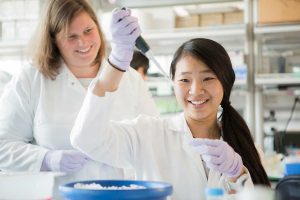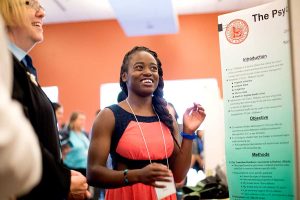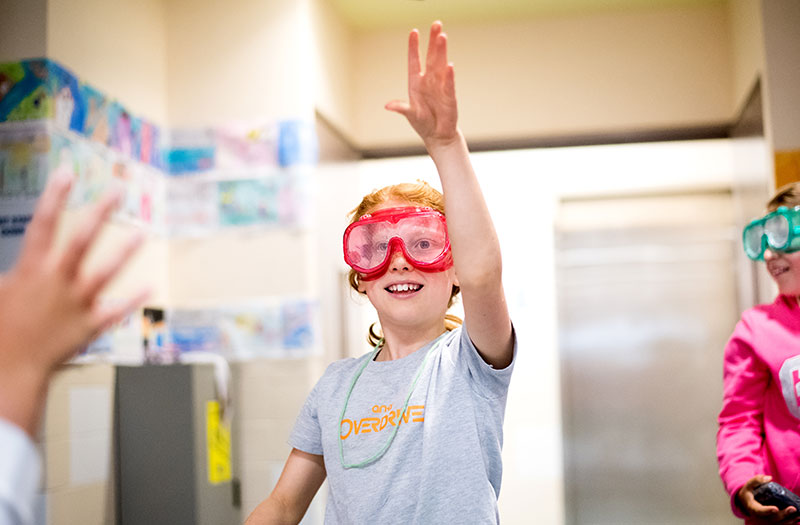Mentors must be affiliated with UCSF; we welcome graduate students, postdocs, faculty, and staff to apply.
Through this program, high school students from San Francisco public and charter schools complete authentic biomedical research projects with their mentors for 8 weeks during the summer. Stipends for students and scientist mentors included!
Mentors are the day-to-day guide and teacher for the intern, and support them in all aspects of the lab experience.
As a mentor, you’ll:
 Develop a research project for your intern. This may mirror your research or could be a new project (or side project) related to your work.
Develop a research project for your intern. This may mirror your research or could be a new project (or side project) related to your work.
They are current juniors at San Francisco public/charter schools, are excited and curious about science, and are motivated to work with a UCSF scientist.
We aim to recruit and select students who have expressed some interest in science…even just a little. Our goal is to support students developing a sense of belonging in science and broaden their ideas about college and careers in the biomedical sciences. We don’t use grades or GPA in our selection process. We rely on application essays and interviews with students to assess their interest and motivation to participate in the program.
Thank you for your interest in mentoring with SEP’s High School Intern Program! Click below to register to be a mentor for the summer 2025 program.
Curious about what it would look like to mentor a student? Check out our mentor manual below!
Register for an info-session and find out more about mentoring a high school student!
Questions
Contact: Lakisha.witzel@ucsf.edu | 415.364.8077
Students selected for the High School Intern Program are current juniors (11th grade). They attend between their junior and senior year of high school, so you may see them referred to as “rising seniors”. All students in the program attend public high school in San Francisco.
Students submit an application which includes an essay describing why they’re interested in the program and what they hope to gain from their participation. A subset of applicants are selected for an interview where our interview team is further assessing program interest, maturity and ability to persist through a challenging 8-week program.
Additionally, we hope to offer this opportunity to students who want to explore a potential interest in science, even if this is just the beginning of that exploration.
From roughly 50 interviews, 25 students are selected to participate.
It’s rare for us to turn away any scientist who’d like to participate and can create a meaningful learning opportunity for their intern. That being said, we may exercise caution in the following scenarios:
Mentors serve as the day-to-day guide and teacher for the intern, and support them in all aspects of the lab experience, as well as with the preparation for their talk and final poster presentation. Our aim is to give our interns the opportunity to work on a research project, explore career options, experience a university environment, and learn from a mentor. In this role you would:
We have two opportunities depending on research topics. The California Institute for Regenerative Medicine (CIRM) funds 10 of our interns, who are in lab 30 hours per week. These interns are given a $4500 stipend for their participation. The remaining interns are in lab 20 hours per week and are given $3200 as a stipend for their participation. Funding for these interns comes from the NIH NINDS, UCSF Chancellor, School of Medicine and Executive Vice Chancellor, the Silicon Valley Community Foundation and the Baskin Family Foundation.
Yes!* We are able to offer a stipend to mentors in the following ways:
*Note that certain payroll title codes are not eligible to receive participation incentives per UCSF policy. Please inquire if you are unsure of your eligibility to receive this.
Yes! Developing science communication skills is an important part of this program. Interns develop an abstract, give a 10 minute oral presentation, and present a science poster. Throughout the summer, interns attend weekly meetings with SEP staff to learn about and practice these skills but the mentor is expected to guide the intern to ensure accuracy and understanding of their writing and/or presentations.
June 9 – August 1, 2025. The program begins with a multi-day orientation for the interns. You should plan for them to start in the lab on Tuesday, June 10th.
We are happy to strategize around this with you. Our hope is that mentors are not away for more than one week at a time since that can be disruptive for the intern and their project. Ways you can support the intern while you’re away: connect the student to another person in your lab early in the experience so they can work together; schedule meetings online to check in with your intern; guide the intern with independent work that will move their project along.
Yes! We love this model. It does mean collaborating to develop a project for your intern so typically works best when you’re in the same lab.
Definitely. Our interns often enjoy having a high school peer to work with in the lab and ideally they are doing similar projects but not the same. Each intern will still be expected to present independently for the 10-minute talk and poster session.
All of SEP’s programs are offered free-of-charge. To do this work, SEP must annually raise nearly $2 million. Every donation brings us closer to that goal and helps to make this important work possible.

As part of UCSF, SEP is a 501(c)3 non-profit. All donations are tax deductible to the fullest extent of the law. Please let us know if your company participates in a matching gift program so that we can extend the benefit of your generosity.